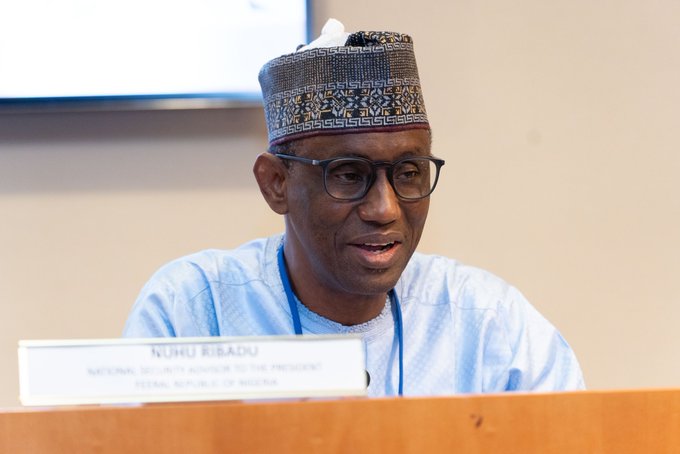The Federal Government has said that a high-level Nigerian delegation currently in the United States is working intensively to correct what it describes as false and misleading narratives suggesting that Christians are being targeted for persecution or genocide in Nigeria. The delegation is led by the National Security Adviser (NSA), Malam Nuhu Ribadu, and includes senior officials from key security and policy institutions.
Minister of Information and National Orientation, Mohammed Idris, disclosed this during an interview on Channels Television’s Politics Today on Saturday evening. He explained that the Nigerian team is holding a series of strategic engagements with U.S. government officials and lawmakers to provide clear, fact-based briefings on Nigeria’s security situation.
“We are not leaving any space for misinformation to stand,” Idris said. “Our officials are in Washington with facts, data, and a clear message, which is that there is no government-sponsored persecution of any religious group in Nigeria.”
The visit follows recent discussions in the U.S. Congress and increased advocacy efforts by international groups claiming that Nigeria is experiencing widespread, targeted attacks against Christians. Some of these groups have even framed the situation as “Christian genocide,” prompting debates in Washington and calls for stronger diplomatic responses.
Nigeria, as Africa’s most populated country with nearly equal Christian and Muslim populations, has for many years struggled with insecurity, including terrorism, banditry, and farmer-herder clashes. These conflicts, often driven by criminal, economic, and ethnic factors, have claimed lives across religious lines. However, global attention sometimes focuses heavily on attacks affecting Christian communities, leading to claims that the Nigerian government is failing to protect religious minorities.
The Federal Government says these claims misrepresent the situation and ignore the complex nature of Nigeria’s security challenges.
According to the Minister, the Nigerian delegation has already met with senior American officials, including the U.S. Secretary of War, members of the U.S. Congress, and officials from the State Department. The team also held discussions with other stakeholders who shape U.S. policy on Africa.
During these meetings, the delegation reportedly presented detailed evidence showing that extremist attacks in Nigeria have targeted both Christians and Muslims. They also highlighted the government’s ongoing counter terrorism operations, inter-agency collaboration, and reforms aimed at strengthening national security.
“These engagements are crucial for correcting misconceptions that have been amplified during recent congressional discussions and advocacy campaigns,” Idris said. “We are showing our partners the full context of the security situation, the steps the government is taking, and the fact that extremists have killed both Christians and Muslims. These narratives of genocide are not only incorrect—they are dangerous.”
Nigeria’s security challenges have evolved over the past decade. Boko Haram’s insurgency in the North-East, which began in 2009, has claimed thousands of lives and displaced millions of people. The group initially targeted government installations and Muslim clerics who opposed them, but later expanded attacks to churches, mosques, schools, and civilian communities.
As Boko Haram weakened, splinter groups like ISWAP emerged, intensifying attacks in the Lake Chad region. Meanwhile, armed banditry in the North-West and parts of the North-Central has led to mass kidnappings, attacks on villages, and destruction of farmlands. Farmer-herder conflicts—often driven by land pressure, climate change, and resource competition—have also resulted in casualties.
These overlapping conflicts have affected Nigerians from all walks of life. Many experts note that attackers rarely target victims solely based on religion, even though some sites of attack, such as churches or mosques, give incidents a religious appearance.
The Federal Government argues that conflating these security issues into a narrative of state-backed persecution oversimplifies the reality and harms Nigeria’s international standing.
In his interview, Minister Idris said President Bola Ahmed Tinubu views the matter very seriously. He explained that the administration has already taken steps to improve internal security, enhance intelligence capabilities, and strengthen military operations across conflict zones.
He added that Nigeria has expanded cooperation with international partners in areas such as intelligence sharing, counter terrorism training, and equipment support.
“The mission of the delegation underscores the determination of President Tinubu’s government to defend Nigeria’s reputation and ensure that foreign partners base their decisions on verified information, not one-sided narratives,” he said.
Idris stressed that Nigeria’s relationship with the United States remains strong. He said the ongoing engagements reflect the Tinubu administration’s commitment to transparency, dialogue, and cooperation with international partners.
The Minister noted that additional meetings are scheduled in the coming days as part of a “structured government-wide response” to the misleading information circulating about Nigeria’s security situation.
He added that the government wants to avoid a repeat of past diplomatic tensions where Nigeria was placed on watchlists or unfairly judged on the basis of incomplete or exaggerated reports.
Accusations of religious persecution carry serious implications. In the past, the U.S. has designated certain countries as “Countries of Particular Concern” based on perceived religious freedom violations—a label that can lead to sanctions, visa restrictions, and diplomatic pressure.
The Federal Government fears that if the narrative of persecution continues to grow unchecked, it could harm Nigeria’s diplomatic relations, investment climate, counter terrorism collaboration, and international reputation.
“The government must defend Nigeria’s global image,” Idris said. “We cannot allow misinformation to influence how our partners see us or how they choose to engage with us.”
The Information Minister urged Nigerians to remain calm and trust that the Federal Government is handling both the internal security challenges and the international concerns.
He said the government will continue engaging with the U.S. and other partners to ensure that Nigeria is accurately represented on the global stage.
“We are confronting insecurity at home while also making sure that no false narrative is accepted abroad,” he assured.

